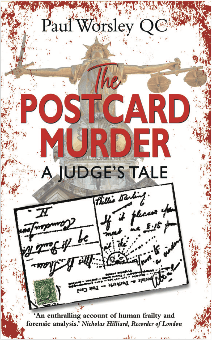By Master Paul Worsley
Book Review by Master Peter Murphy
Master Peter Murphy was Called to the Bar in 1968. In 1983 he was appointed to the committee which created the American Inns of Court Foundation of which he is a lifetime emeritus trustee. From 1998-2007 he was defence counsel at the International Criminal Tribunal for the Former Yugoslavia in The Hague. He was appointed a Circuit Judge in 2007 and sat at Blackfriars and Peterborough Crown Courts until his retirement. He was made a Bencher in 2013 and was Autumn Reader in 2018.
My first introduction to Master Paul Worsley took place when we were both much younger and plying our trade at the Bar, I in London and Master Worsley in a more northerly clime. A client of mine was foolish enough to expand his horizons beyond London to try his luck as a burglar of commercial premises in Yorkshire. I represented him at his trial in York and we were prosecuted by Master Worsley, who tells me he does not remember the case. I do. The defendant ran the defence of alibi, claiming that at the relevant time he had been tucked up in bed with a woman he should not have been tucked up with. It turned out that the lady in question, an essential defence witness, had form for attempting to pervert the course of justice. Not promising, as these things go. On the second day of the trial a local solicitor and soothsayer approached me in the robing room, and in a doom-laden voice, prophesied, ‘It’s a London defence, is that. They’ll not have it up here’. He was quite right: they did not.
I was reminded of this traumatic episode in my professional life when Master Worsley asked me to review his book The Postcard Murder: A Judge’s Tale. The publisher’s back cover promotion of the book describes it as a ‘vintage whodunit’, which in a sense I suppose it is. But it is a description that misses the essential point of this imaginative and meticulously researched and written inquiry into a judicial mind, because this is a book concerned less with a murder case than with the wisdom and foibles of the judge who tried it. I doubt that readers in the legal profession will find any great mystery in the outcome of the trial, any more than the Yorkshire soothsayer did in my client’s case. But Master Worsley’s analysis of Mr Justice Grantham, then as now a controversial figure, makes The Postcard Murder a compelling read.

The story begins on Friday 13 September 1907, when the Daily Mail reported the discovery of the naked body of a young woman, referred to as Mrs Shaw, in the bedroom of her flat in Camden Town. She had been brutally murdered, her head almost severed from her body as a result of a wound to the throat. The body was discovered by her husband, Bert Shaw, a restaurant car attendant for the Midland Railway, on his return from a journey to Sheffield. Bert also discovered a postcard album, usually kept in the living room, lying in the bedroom with a number of the postcards pulled out. A number of items of value were missing, including Mrs Shaw’s wedding ring, though other equally valuable items were not taken.
Almost at once, the case took on a somewhat scandalous aspect. Emily Elizabeth Shaw, née Dimmock, was not married to Bert Shaw, though they had been living together since January of the same year. Moreover, to the men she took to bed for money, she was known, not as Emily, but as Phyllis. Instantly, the case took on a dimension other than its first impression of a burglary gone wrong. Men she knew in the King’s Cross area where Phyllis had plied her trade, whether clients or not, became suspects overnight as a group.
One such man was eventually elected – or, perhaps more accurately, elected himself as the prime suspect. His name was Robert Wood. He was a talented commercial artist and craftsman in glassware, employed by a firm in Gray’s Inn Road, who was rapidly making a name for himself with his innovative creations. Wood was not only a man of previous exemplary character, but also one seen by friends and colleagues as kind, courteous and of a peaceful disposition. But he was also to demonstrate another remarkable talent – one for putting himself in peril by means of disastrously ill-judged efforts to prove his innocence. The worst of these was soliciting a former lover, a prostitute called Ruby Young, to provide him with at least one false alibi. His father, an eminently credible witness, was later to provide him with a credible alibi for the actual time of death – which the proposed alibis by Ruby Young did not cover. Wood had undoubtedly struck up a relationship with Phyllis at the Rising Sun pub on Euston Road, one of her haunts, though he insisted, almost certainly untruthfully, that it had begun only a week before her death. He had undoubtedly been with her earlier on the night of her death.

Then there was the postcard, which had not been found during the initial investigation, and was discovered, having apparently been deliberately concealed, only two weeks after the discovery of Emily’s body. Its content was innocuous enough, a simple request for an assignation. But an accumulation of circumstantial evidence convinced the police that the man who had written it was the murderer and had killed Emily during an unsuccessful attempt to recover the postcard. Ruby Young would later give evidence that she recognised Wood’s handwriting on the postcard when an image of it was published in the press; and Wood would admit to the police, under caution, that he had written it, although he had not come forward to say so when it was first publicised. But there was never any direct evidence against Robert Wood, and, but for his own ineptitude, it may be that he would never have been charged.
Master Worsley has Grantham sit down in the comfort of his club, the Athenaeum, after the excitement of the case has died away to some extent, and relate his recollections of the case to his son, William, a barrister. His final verdict on his conduct of the case is striking.
‘William, I fear that I got it wrong. I should never have addressed the jury as I did. I was wrong to [comment so strongly on the evidence] … That was a decision for them to make without pressure from anyone, however experienced a criminal lawyer.’
This is interesting on a number of levels. Master Worsley includes Grantham’s obituary in The Times, which refers to his conduct of the second of the two cases in which the unfortunate Adolf Beck was wrongly convicted as a result of misleading identification evidence. This case was to prove the basis, not only for our contemporary understanding of the dangers of evidence of visual identification, but also for the creation of the Court of Criminal Appeal as a much needed functional appellate tribunal for criminal cases. Grantham had been worried about the guilty verdict and postponed sentence pending a further inquiry, which swiftly showed that Beck had been wrongly convicted.
In his letter to the Home Secretary about the Beck case, Grantham said, ‘In a moment, I determined what to do – to back my own opinion against the evidence’. That was a fair summary of Grantham’s often impetuous approach to his cases and indeed to other aspects of his professional work. It is an instinct of which many judges of his time would undoubtedly have disapproved. But it ensured justice for Adolf Beck, and I personally emerged from the book with the conviction that it also did so in the case of Robert Wood, despite Grantham’s own misgivings.
Despite his undoubted abilities as a lawyer and a judge, Grantham’s career was also marked by what The Times called ‘breezy effusions of a spirited nature on the Bench’ and by appallingly ill-judged observations about individuals not only on the Bench, but in the political arena. Master Worsley devises a fascinating mental construct for Grantham’s remorse over his conduct of the case of Robert Wood, rooted in Freudian psychology: his deprivation of his mother in childhood, his ‘obsession’ with Emily and Ruby as part of a ‘Madonna-Whore complex’, and even an association in the postcard with the Belgian city of Bruges, which I will leave it to the reader to discover for him or herself. I cannot do full justice to this construct in a review. Suffice it to say that it is brilliantly written and compelling, and does much to illuminate the kinds of inference drawn in those days from circumstantial evidence, which seem so alien to what we like to see as our more scientific approach to such evidence today.
There is much more in The Postcard Murder to keep the reader enthralled with Grantham, as a man and a judge. Master Worsley has provided us with a unique insight into a judicial mind in a different time, a time in which, although the outward trappings of the criminal trial may have changed relatively little, the judicial mind was very different. It is a book which perhaps could only have been written by an author who himself exemplified so well the best qualities of an English trial judge during his distinguished tenure at the Old Bailey. Highly recommended.

